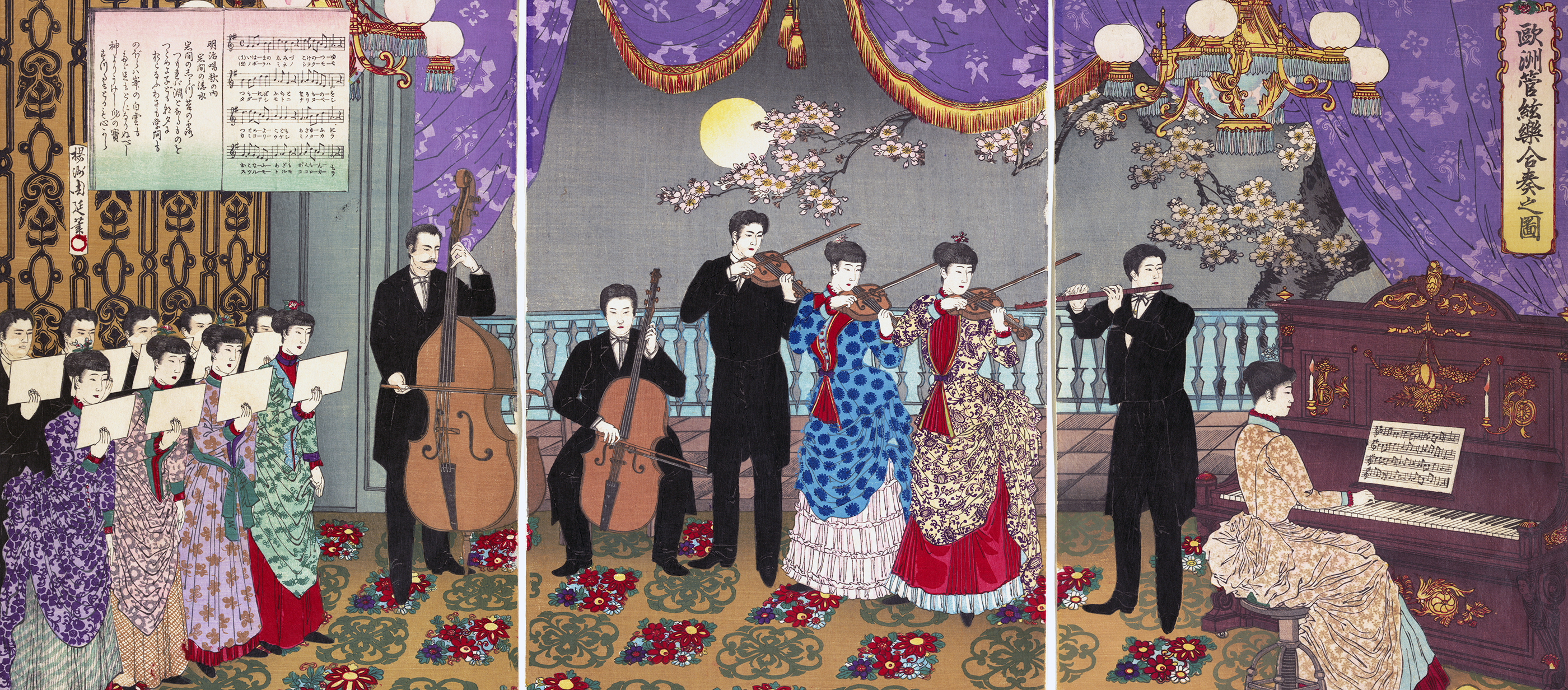The almost insoluble task is to let neither the power of others, nor our own powerlessness, stupefy us.
—Theodor Adorno, 1951The Foreign Spell
To be a foreigner is to be perpetually detached, but it is also to be continually surprised.
By Pico Iyer

Entrance of Goa Gajah, or the Elephant Cave, near Ubud, Bali. Image courtesy of China Crisis.
The foreign has long been my stomping ground, my sanctuary, as one who grew up a foreigner wherever I happened to be. Born to Indian parents in Oxford, England, I was seven when my parents moved to California; by the third grade, I was a foreigner on all three of the continents that might have claimed me—a little Indian boy with an English accent and an American green card. Foreignness became not just my second home, but my theme, my fascination, a way of looking at every place as many locals could not. As some are born with the blessing of beauty or a musical gift, as some can run very fast without seeming to try, so I was given from birth, I felt, the benefit of being on intimate terms with outsiderdom.
It’s fashionable in some circles to talk of Otherness as a burden to be borne, and there will always be some who feel threatened by—and correspondingly hostile to—anyone who looks and sounds different from themselves. But in my experience, foreignness can as often be an asset. The outsider enjoys a kind of diplomatic immunity in many places, and if he seems witless or alien to some, he will seem glamorous and exotic to as many others. In open societies like California, someone with Indian features such as mine is a target of positive discrimination, as strangers ascribe to me yogic powers or Vedic wisdom that couldn’t be further from my background (or my interest).
Besides, the very notion of the foreign has been shifting in our age of constant movement, with more than fifty million refugees; every other Torontonian you meet today is what used to be called a foreigner, and the number of people living in lands they were not born to will surpass 300 million in the next generation. Soon there’ll be more foreigners on earth than there are Americans. Foreignness is a planetary condition, and even when you walk through your hometown—whether that’s New York or London or Sydney—half the people around you are speaking in languages and dealing in traditions different from your own.
Yet for all the global culture and busy crossroads we might share, it’s treacherous to assume these imply common values or assumptions. It’s one thing to note with amusement how there are “two-and-three” counts at the ballparks in Japan, or to be unable to distinguish the characters for left and right on the signs in China. It’s quite another to be somewhere where you’re not even sure who’s living and who’s dead. “O brave new world, / That has such people in’t,” exclaims innocent Miranda in Shakespeare’s The Tempest, as she sees the first foreigners she’s ever glimpsed (though in truth they come from Milan, as she originally did). “Tis new to thee” is her wise father Prospero’s dry response.

Jap…You’re Next! We’ll Finish the Job, by James Montgomery Flagg, 1944. U.S. National Archives and Records Administration, College Park, Maryland.
The first time I set foot on Indonesia’s Hindu island of Bali, I was enchanted by everything I didn’t recognize, as if it were out of a fairy tale: the nymphs performing eye-rolling dances in the temple courtyards before bare-chested men plunged mock-daggers into their hearts to simulate mass exorcisms; the fact that children weren’t allowed to touch the ground their first many months on earth, so they’d remain closer to the realm of angels; the stories people told me of how, if I wore green, I’d be swept away by the ocean; the jangled, hypnotic near-melodies of the gamelan, clangorous notes between the trees, playing well into the night. Foreignness took many forms, but most of them, as I came to find, proved indecipherable. I had been keen to see foreignness as part souvenir and part snapshot, like any postcard-seeking tourist, and yet just as often it was rising up all around me, devouring, and reminding me of how far from useful my judgments could be.
“When you in America want to communicate with each other,” I once heard a Balinese matter-of-factly declare, “you communicate by telephone. When I need to say something to my brother, we communicate by telepathy. I send a thought and he catches it.” He wasn’t playing only to foreign credulity, and I didn’t know quite what to make of his claim. I only sensed that he believed this to be true. And when I was stepping onto his island, I was stepping into his belief system, whether I wanted to or not.
F>rom the moment westerners began living in Bali, soon after World War I, they sent back two messages, more or less contradictory: first, they were no longer foreign—they had gone native, and felt wonderfully at home in Eden; second, the rest of us would always remain outsiders, the gates to the garden having closed behind them. By 1930, Hickman Powell, a reporter from Duluth, was entitling his book on Bali The Last Paradise; soon thereafter, the Mexican artist Miguel Covarrubias, author of Island of Bali, was wondering if Paradise was lost when its denizens began wearing shorts. Here was a truly unfallen place, every newcomer seemed to report, which would fall as soon as the next newcomer disembarked.
This is the point of the foreign. We don’t travel halfway across the world to find the same things we could have seen at home. Those who undertake long and dangerous journeys have every incentive in stressing their discovery of a world far better than the one they left behind. Paul Gauguin became a “true savage, a real Maori,” he wrote, after he traveled deep into the jungles of Polynesia (having found his first port of call, Papeete, a place polluted by “the absurdities of civilization”). His outsider’s appeal in the South Seas put to shame his Everyman status as an artist of uncertain prospects back in Paris. Somerset Maugham later adapted Gauguin’s story into a novel, The Moon and Sixpence, reminding readers that any distant port might be more liberating and richer in romance than a stockbroker’s life.
Around the same time, D.H. Lawrence was thrashing through his own “savage pilgrimage” in which, famously, he alighted on Australia, Ceylon, and New Mexico in quick succession, pronouncing each one heaven until, within a few days, he decided it was hell. The violence of his responses reflected the tumult of his relations with everyone around him—he had the gift, perhaps, of conflating the foreign and the familiar—but in each place, he saw a tabula rasa onto which he could project his fear or hope. Gertrude Bell had noted that “the East is full of secrets—no one understands their value better than the Oriental; and because she is full of secrets she is full of entrancing surprises.” One thing Bell chose not to acknowledge was that for the “Orientals” around her she was the real surprise—and keeper of secrets—as an unmarried Englishwoman who appeared only to want to live far from home, scaling mountains and studying ruins.
Nowadays, we’re eager to note how much travel reveals our shared humanity: idealistic kids returning from a semester abroad in Cape Town or Jerusalem are likely to stress the similarities between places—the kinship they found, the friendships they formed. In earlier times, perhaps, the length and severity of a journey intensified a traveler’s sense of shock when docking in Africa or India; now that a Dreamliner can whisk us to Tibet with only a two-hour layover in Hong Kong, it’s much easier to underestimate—and dangerously elide—our differences.
My first night ever on the island of Bali, in 1984, I fell under what I later came to see was a spell cast on me by a young local woman, who led me into the unlit back alleyways and wound me around her almost as if I were helpless. I had done what I could to domesticate the island on arrival: I bought a pirated Dire Straits cassette and an owl mask as a good-luck souvenir; I mapped out a routine, locating where I could get good cake, where to post my letters home. In any case, a part of me was still in Manhattan, where I’d been closing a long article on Iran in the twenty-fifth-floor offices of Time only a day before. And so when this youngish woman came up to me at sunset on Kuta Beach, I was pleasantly surprised—I’d entered A Midsummer Night’s Dream, I thought—even as she coaxed me through the alleyways into the thick forests only minutes away.
It wasn’t long before I realized how out of my depth I was in this charged, supersaturated, animist landscape. Romance in most circumstances can have the aspect of a foreign country, but in an alien setting the unsettledness can overwhelm you. When I revisited the island a year later, I took pains not to alert my former friend. Yet there she was, next to the check-in desk my first night back, as if she’d been expecting me. I tried to assert some distance—a foreigner shouldn’t travel too deeply into what he doesn’t understand, I told her—and she cast another spell on me, as my skeptical mind was obliged to acknowledge, and I lay poleaxed in my room for seven days and nights.
The light switches on my wall I took to be geckos. The purrs and sighs of a Balinese girl in the next room, making a fuss over her Aussie boyfriend, were a moment-by-moment torment. I couldn’t sleep and I couldn’t not sleep; I thought of how the owl mask I’d bought a year before had proved so potent when I put it up on my wall on Twentieth Street in New York that I had to tear it down minutes later. A doctor might have told me that I’d caught the flu—though I showed no external symptoms—or dismissed my ailment as something in my head. But really the truth of it was that the girl—or her culture—had gotten inside my head, and now I could no longer tell what she had wrought and what was mere circumstance.
I still often meet travelers who rhapsodize about the seductions of this fantasy island, as if to deny that Paradise is a place with a serpent and a Tree of the Knowledge of Good and Evil that it’s fatal to eat from. An anthropologist’s nirvana with its complex customs—foreigners cannot hang their laundry higher than a temple, and signs strictly remind you not to enter certain sites while menstruating—Bali also has long been a tourist’s delight: you can fly bird-headed kites, learn that everyone, male or female, has one of the same four names, or hear about room 327 in the Grand Bali Beach Hotel reserved for a goddess (when a fire destroyed the place in 1993, it was one of the only rooms to survive). In case the swaying love songs of South Pacific and the ready epiphanies of the New Age needed any refueling, Julia Roberts sat before a wise-eyed, twinkling Balinese sage in the 2010 movie Eat, Pray, Love, and, lo and behold, by the end of the film she was sharing a cabana with Javier Bardem.

Concert of European Music, by Yoshu Chikanobu, 1889. The Metropolitan Museum of Art, Gift of Lincoln Kirstein, 1959.
But Elizabeth Gilbert, in the book that inspired the movie, was too shrewd and seasoned an observer to think that the foreign could be tamed so easily. One of the island’s earliest visitors wrote that “the Balinese are a fierce, savage, perfidious and bellicose people,” and although that was the language—perhaps the prejudice—of the day, the place was most famous by the seventeenth century for its slaves and human sacrifices. Over the centuries that followed, other Indonesians came to view Bali—whose gamelan music is all dissonance and cacophony next to the elegant restraint of, say, Java—with much more watchfulness and distance than most foreigners would. And when, in 1965, anti-communist riots erupted across Indonesia, the rivers of Bali ran red with blood as temple-goers cut down their neighbors with machetes and sticks. Eighty thousand people were slaughtered all but overnight. Violence was terrible throughout the land, but nowhere was it as hideous as in Bali, where killers were said to have drunk their victims’ blood.
The foreign is never going to be a pure and simple thing on an island with a temple guarded by poisonous sea snakes and a cave filled with thousands of bats. The dances that transfix tourists in Bali play out an ancient, implacable battle between good and evil, even if one we can grab with our iPhones. It is from the languages around this archipelago that our word amok comes, to refer to those possessed; and if, as most guidebooks tell us, there are more temples than homes on the island, it only follows, surely, that you are walking, as a foreigner, through an atmosphere thick with totems, taboos, and demons.
Growing up, I soon saw that I was ill-equipped for many things by my multi-continental upbringing—I would never enjoy settling down in any one place, and I wouldn’t vote anywhere for my first half-century on earth—but I saw, too, that I had been granted a kind of magic broomstick that few humans before me had ever enjoyed. By the age of nine, flying alone over the North Pole six times a year—between my parents’ home in California and my schools in England—I realized that only one generation before, when my parents had gone to college in Britain, they had had to travel for weeks by boat, sometimes around the stormy Cape of Good Hope. When they bid goodbye to their loved ones—think of V.S. Naipaul hearing of his father’s death while in England, but unable to return to Trinidad—they could not be sure they’d ever see them again.
At seventeen, I was lucky enough to spend the summer in India, the autumn in England, the winter in California, and the spring bumping by bus from Tijuana down to Bolivia—and then up the west coast of South America. I wasn’t rich, but the door to the world was swinging open for those of us ready to live rough and call ourselves foreigners for life. If my native India, the England of my childhood, and the America of my official residence were foreign, why not spend time in Yemen and on Easter Island?
In retrospect, it seems inevitable that I would move, in early adulthood, to what still, after twenty-seven years of residence, remains the most foreign country I know, Japan. However long I live here, even if I speak the language fluently, I will always be a gaikokujin, an “outsider person,” whom customs officials strip-search and children stare at as they might a yeti. I’m reminded of this on a daily basis. Even the dogs I pass on my morning walks around the neighborhood bark and growl every time they catch wind of this butter-reeking alien.
No nation is fit to sit in judgment upon any other nation.
—Woodrow Wilson, 1915Japan remains itself by maintaining an unbreachable divide between those who belong to the group and those who don’t. This has, of course, left the country behind in an ever more porous world of multiple homes, and is a source of understandable frustration among, say, those Koreans who have lived in the country for generations but were—until relatively recently—obliged to be fingerprinted every year and denied Japanese passports. Yet for a lifelong visitor, the clarity of its divisions is welcome; in free-and-easy California, I always feel as accepted as everyone else, but that doesn’t make me feel any more Californian. Besides, I know that Japan can work as smoothly as it does only by having everyone sing their specific parts from the same score, creating a single choral body. The system that keeps me out produces the efficiency and harmony that draws me in.
I cherish foreignness, personally and internationally, and feel short-shrifted when United Airlines, like so many multinationals today, assures me in a slogan, “The word foreign is losing its meaning”; CNN, for decades, didn’t even use the word, in deference to what it hoped would be a global audience. Big companies have an investment in telling themselves—and us—that all the world’s a single market. Yet all the taco shacks and Ayurvedic doctors and tai chi teachers in the world don’t make the depths of other cultures any more accessible to us. “Read The Sheltering Sky,” I want to tell my neighbors in California as they talk about that adorable urchin they met in the souk in Marrakesh. Next time you’re in Jamaica—or Sri Lanka or Cambodia—think of Forster’s Marabar Caves as much as of the postcard sights that leave you pleasantly consoled. Part of the power of travel is that you stand a good chance of being hollowed out by it. The lucky come back home complaining about crooked rug merchants and dishonest taxi drivers; the unlucky never come home at all.
On my most recent visit to Bali—my fifth trip since 1984—a part of me was almost relieved, on arrival, to see that the roads leading away from the airport housed an almost unbroken sequence of massage parlors—smile, bliss, relaxation—tending to the less exalted needs of foreigners. (A massage in Bali, given only by old ladies, often blind, when first I visited, is now the province of young girls and boys who all but guarantee a “happy ending.”) Gaudy karaoke parlors poked above the trees, assault rifles were on sale near signs advertising extreme combat weekends. The first word that greeted me in the airport was death—for those who bring drugs into Bali; the signs spelling out such rules in Chinese and Arabic might have been reminding us that this was now a place consecrated to foreign pleasure.
Up in the hills, honoring the island’s longtime segregation of its foreign markets, was a labyrinth of exquisite, candlelit spas and restaurants, mostly in identical minimalist style; lanterns led through a temple entrance to what might be the more spiritual forms of massage or daily bread. Emerald pools gleamed in the dark, and visitors sipped at apple mojitos while wondering when to sample some Hindu meditation. Brahma Kumaris World Spiritual University was, I noticed, not far from the Foreign Development Investment Council.
But the beauty of Bali, as I see it, is that the world of and for foreigners, the tantra courses and salsa workshops and Mexican restaurants, don’t begin to intersect with the currents surging below and above us; we are as far from the people around us as the “rude mechanicals” in A Midsummer Night’s Dream are from the courtiers and gods who toy with them. The Balinese man I met my first night on the island on this trip said, “We are afraid of going out at night. There are people who can turn into animals, who can do anything if they want.” As he drove me back to the luxury villa I’d been given free of charge—private swimming pool attached—he spoke of leyak witches who fly through the air here and “left-handed tantra masters” who travel these days by Beemer or Suzuki Shogun. I didn’t know what he was going on about, and it didn’t matter. Even if I had understood, it wouldn’t have protected me against what would always remain foreign.
Among the Beverly Hills–worthy sanctuaries that encircle the village of Ubud—full of signs for paradise regained, bikini parties, and furniture stores called Reincarnation—people will tell you that Bali is “spoiled,” as if choosing to forget that this is what the island has been tempting every visitor to say since the beginning. And as if the so-called spoiling makes the place any less eerie or unsettling or unfathomable. Pundits assure us the world is homogenized now—there are KFCs everywhere on Bali, and DHL will now send your owl masks back to Santa Monica almost overnight—but forty years of travel, from Bolivia to Ladakh to Ethiopia, Beirut, and North Korea, have only convinced me of the opposite.

From Spaniard and Black, Mulatto, Mexico, c. 1790. Museo de América, Mexico.
Not long ago, I was walking along a narrow lane beside a quiet stream north of Kyoto, a picturesque scene worthy of a Hiroshige woodcut. I saw a small shrine up a flight of stairs, and was about to climb up to inspect it—lots of other visitors were looking around—when my wife, born in Kyoto, stiffened; this, she said, was where black rites were conducted at midnight, and human sacrifices. This sounded implausible to me in her Westernized, highly secular homeland, but she was determined not to go closer, and I thought to myself that Japan is one foreignness I’ve chosen to live with. After more than a quarter of a century here, I feel I know which boundaries not to overstep.
But in a place I’m just visiting—in the local paintings you see all over Bali, it’s impossible to see where the trees end and the humans begin—I can’t make out where the boundaries are demarcated. I was walking through my ancestral homeland, India, one warm evening in 2009, and recalling, with amusement, the signs I’d seen earlier in the day, advertising mcveggies with cheese at the local Golden Arches, the little shacks calling themselves glorious ladies tailors, the billboards that announced british school for languages is now trounce education. It’s a blessing to be a foreigner everywhere, detached and able to see the fun in things.
Then I noticed an orange glow in the air and looked along the holy Ganges to where bodies were being burned. Excited crowds of men raced through the narrow lanes of the old town to commit their loved ones to the flickering flames; bonfires burned along the riverbanks to the south and to the north. As so often in India, it was hard to tell whether I was in a riot or a festival. I’m of Hindu origin myself, and this sacred city might be one of the places that I could call home. But all I thought then was that nearly everywhere I knew was foreign, which meant that nearly everywhere had the power to unsettle and surprise me, forever.




